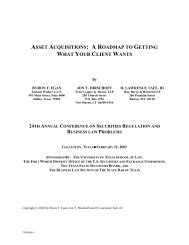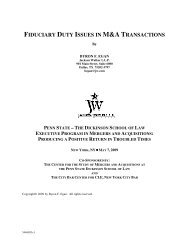- Page 1 and 2: BUSTED M&A DEALS HEADED FOR LITIGAT
- Page 3: VII. SELECTED ASSET PURCHASE AGREEM
- Page 7 and 8: 1986, as amended (the “Code”)).
- Page 9 and 10: A purchase of assets also is cumber
- Page 11 and 12: • Liabilities can be assumed by i
- Page 13 and 14: of stock would avoid this “double
- Page 15 and 16: There are a number of business reas
- Page 17 and 18: The Third Circuit’s reasoning sug
- Page 19 and 20: that every buyer would be liable fo
- Page 21 and 22: (b) Environmental On the environmen
- Page 23 and 24: and actual conflicts of interest th
- Page 25 and 26: develop that a waiting period would
- Page 27 and 28: 12. CONFIDENTIALITY................
- Page 29 and 30: Agreement The parties, intending to
- Page 31 and 32: “Breach” -- any breach of, or a
- Page 33 and 34: use, voting (in the case of any sec
- Page 35 and 36: “Ground Lease” -- any long-term
- Page 37 and 38: “Order” -- any order, injunctio
- Page 39 and 40: “Part” -- a part or section of
- Page 41 and 42: “Seller Contact” -- as defined
- Page 43 and 44: COMMENT Clauses (v), (vii), (viii)
- Page 45 and 46: parties should always pay close att
- Page 47 and 48: therewith (the “Business”), inc
- Page 49 and 50: carefully review the breadth of thi
- Page 51 and 52: Course of Business prior to the Eff
- Page 53 and 54: uyer to negotiate the indemnificati
- Page 55 and 56:
2.5 ALLOCATION The Purchase Price s
- Page 57 and 58:
satisfaction of some conditions may
- Page 59 and 60:
(iii) the Escrow Agreement, execute
- Page 61 and 62:
Once a certified check has been cer
- Page 63 and 64:
espect to the Real Property and Tan
- Page 65 and 66:
work papers and other documents and
- Page 67 and 68:
expressly provide for arbitration i
- Page 69 and 70:
Closing, the parties shall use Best
- Page 71 and 72:
Alternatively, the Buyer can elect
- Page 73 and 74:
environmental representations that
- Page 75 and 76:
owned or used by it, or the nature
- Page 77 and 78:
(c) Except as set forth in Part 3.2
- Page 79 and 80:
in the usual and regular course of
- Page 81 and 82:
The term “Contemplated Transactio
- Page 83 and 84:
Seller) a “walk right” if they
- Page 85 and 86:
the evaluation of nearly all potent
- Page 87 and 88:
motion to dismiss, the Court wrote
- Page 89 and 90:
and financing agreements, as well a
- Page 91 and 92:
v. General Housewares Corp., 482 N.
- Page 93 and 94:
Seller is an S corporation as defin
- Page 95 and 96:
(2) The Seller is an S corporation
- Page 97 and 98:
ecause (i) the material adverse cha
- Page 99 and 100:
While noting that IBP v. Tyson appl
- Page 101 and 102:
exception carves out the exclusions
- Page 103 and 104:
In summary, the debate over the con
- Page 105 and 106:
2. pending violations (clause (i));
- Page 107 and 108:
Except as set forth in Part 3.19, s
- Page 109 and 110:
Seller is the owner or licensee of
- Page 111 and 112:
(iii) No Net Name of Seller has bee
- Page 113 and 114:
seventeen years from the date of gr
- Page 115 and 116:
year of registration of a mark to s
- Page 117 and 118:
3. For anonymous works, pseudonymou
- Page 119 and 120:
anticipated uses of the cash, will
- Page 121 and 122:
Fraudulent Transfer Without Intent
- Page 123 and 124:
of the consequences of disclosed it
- Page 125 and 126:
In many acquisitions, the buyer’s
- Page 127 and 128:
(b) except as otherwise directed by
- Page 129 and 130:
ecome directly involved in making b
- Page 131 and 132:
the waiting period, Section 5.4 giv
- Page 133 and 134:
provision because obtaining the Con
- Page 135 and 136:
assure that the new consideration f
- Page 137 and 138:
the Closing, the Buyer may decline
- Page 139 and 140:
Pursuant to this Section, all of th
- Page 141 and 142:
that these historical financial sta
- Page 143 and 144:
means of a “bring down” represe
- Page 145 and 146:
(d) A statement from the holder of
- Page 147 and 148:
Section 7.5 relates only to litigat
- Page 149 and 150:
A seller may take the position that
- Page 151 and 152:
Buyer shall have obtained on terms
- Page 153 and 154:
and (d) have no materiality test. T
- Page 155 and 156:
the part of the seller. In lieu of
- Page 157 and 158:
enefits and salary and wage structu
- Page 159 and 160:
to the sale of any property to the
- Page 161 and 162:
prohibits the Buyer from making any
- Page 163 and 164:
for stock ownership in a public com
- Page 165 and 166:
investigation or assessment) conduc
- Page 167 and 168:
sue on the breach, under the common
- Page 169 and 170:
should be limited to situations in
- Page 171 and 172:
eaches of noncompetition agreements
- Page 173 and 174:
Thomas Drayage & Rigging Co., 442 P
- Page 175 and 176:
the Facilities, Assets, or the busi
- Page 177 and 178:
The issue of control of cleanup and
- Page 179 and 180:
effect that such a materiality qual
- Page 181 and 182:
Section 11.7 provides that claims g
- Page 183 and 184:
Rather than inviting counterproposa
- Page 185 and 186:
Person of its election to assume th
- Page 187 and 188:
Section 11.9(d) permits the Buyer t
- Page 189 and 190:
in order for an indemnity to be enf
- Page 191 and 192:
The Model Agreement follows typical
- Page 193 and 194:
(c) From and after the Closing, the
- Page 195 and 196:
Agreement and all materials of any
- Page 197 and 198:
Party’s Confidential Information
- Page 199 and 200:
The courts have developed two doctr
- Page 201 and 202:
13. GENERAL PROVISIONS 13.4 JURISDI
- Page 203 and 204:
Noting that Tyson had not argued th
- Page 205 and 206:
parties’ negotiations, if any, re
- Page 207 and 208:
may not be available in arbitration
- Page 209 and 210:
Rules and the provisions of this Se
- Page 211 and 212:
As with all ADR provisions, the sub
- Page 213 and 214:
arguing that any limitations on dam
- Page 215 and 216:
disclaimer at issue here is general
- Page 217 and 218:
Disclosure Letter with respect to a
- Page 219 and 220:
an orderly manner and then distribu
- Page 221 and 222:
arred the shareholders’ derivativ
- Page 223 and 224:
there is a fundamental conflict wit
- Page 225 and 226:
e used in lieu of the original Agre
- Page 227 and 228:
pen. A digital signature is not a r
- Page 229 and 230:
the injured party, and who can best
- Page 231 and 232:
Over time, some courts have used le
- Page 233 and 234:
focus of the inquiry is the continu
- Page 235 and 236:
The product line exception is not w
- Page 237 and 238:
Court created the continuity of ent
- Page 239 and 240:
3. Labor, Employment and Benefits C
- Page 241 and 242:
5. Contract Cases In certain instan
- Page 243 and 244:
4. Choice of Law In transactions wh
- Page 245 and 246:
Appendix B ACQUISITION OF A DIVISIO
- Page 247 and 248:
As a general rule, buyer will requi
- Page 249 and 250:
would continue to manufacture and s
- Page 251 and 252:
will require carefully drawn confid
- Page 253 and 254:
EXAMPLE 1 SAMPLE DESCRIPTION OF ASS
- Page 255 and 256:
INTRODUCTION TO TRANSITIONAL SERVIC
- Page 257 and 258:
1.3 “Fully Allocated Cost” shal
- Page 259 and 260:
5. Force Majeure 5.1 Seller shall n
- Page 261 and 262:
12. Entire Agreement 12.1 This Agre
- Page 263 and 264:
SCHEDULE 1.2 FIXED PRICE SERVICES P
- Page 265 and 266:
SCHEDULE 1.4 HR SERVICES HR Service
- Page 267 and 268:
Appendix C In re IBP, Inc. Sharehol
- Page 269 and 270:
If our belief is proven wrong and t
- Page 271 and 272:
Section 5.01. Corporate Existence a
- Page 273 and 274:
the information incrporated (sic) b
- Page 275 and 276:
(b) liabilities incurred in the ord
- Page 277 and 278:
operations that is consequential to
- Page 279 and 280:
Appendix D Frontier Oil Corp. v. Ho
- Page 281 and 282:
ureau, agency or instrumentality, o
- Page 283 and 284:
(a) the Mergers shall not have been
- Page 285 and 286:
(i) by Holly or Frontier, after the
- Page 287 and 288:
Frontier Commences Litigation The f
- Page 289 and 290:
seek the break-up fee was condition

















